At one point or another, we’ve all worked with struggling readers. Sometimes we can tell, on the very first day of school, which students are going to have difficulty. Other times we see students fall a bit behind throughout the course of the year.
But why do certain students fall behind their same-age peers? And what steps can we take to help them catch up?
Throughout the month of January, I’m going to be exploring these topics with you through a series of blog posts. I’ll be digging in deep, sharing with you what I already know, as well as information that I’m learning as I do more professional reading. I will also be sharing free resources that I’ve created to help support you in your work with your students.
Of course, a series of 6 posts couldn’t possible include everything you need to know about helping struggling readers succeed! So I’ve decided to focus the posts on decoding difficulties in primary readers.
In reality, when we’re talking about reading difficulties, it’s nearly impossible to extract just one aspect or skill. For example: a child may struggle with decoding as a result of underlying comprehension issues (if a child isn’t making sense of what he reads, he’s not going to be able to self-correct errors using meaning). Or a student may have poor fluency that is both caused by decoding problems, as well as a result of decoding problems.
Throughout this series, keep in mind that although I’m focusing on decoding for brevity’s sake, it’s only just one piece of the reading puzzle. Furthermore, we have to remember to “keep our eyes on the prize.” The prize, of course, is comprehension – the ultimate goal of reading.
It’s very easy to say to ourselves, “Well, I’ll just get him decoding and then I’ll focus on comprehension.” I am definitely guilty of this myself! But while we may focus on decoding interventions for a certain period of time, we also have to be intentional about teaching comprehension. Because decoding without comprehension isn’t very useful at all!
One other thing I want to quickly mention is that the majority of posts in this series will apply to all K-2 teachers, whether you teach in English or Spanish. However, since I currently teach in Spanish (like some of my readers), I will also be doing a mini-series on supporting bilingual students. Those posts will come in February, following the conclusion of this series.
I’m so excited to get started on this series! I hope that you’ll get a lot of value from it, as well as some free resources you can try out in your own classroom. As always, I love it when you share your own thoughts and experiences in the comments and/or on my Facebook page. Let’s dive in and get started!!
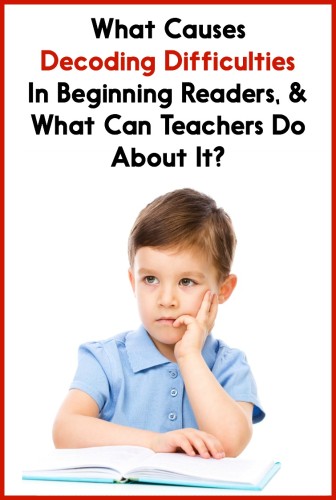
Photo from Shutterstock, Lyubov Kobyakova
What is a Decoding Difficulty?
Before we start digging into how to help struggling decoders, we need to define what a decoding difficulty is. For the purpose of this series, I’m defining a decoding difficulty as being present when:
- A child can only decode texts with greater than 90% accuracy when the texts are significantly below grade level (by 3+ months)
- The reader’s comprehension is negatively impacted by decoding struggles
- The student’s motivation, engagement, and/or overall school performance is negatively impacted by decoding problems
Of course, your team or school may have different criteria to help you decide when to provide reading / decoding interventions. The above definition is just my own working definition for purposes of clarity. The interventions I’ll discuss are helpful for any students who need decoding support.
Sometimes, I’ve found that decoding difficulties can be temporary roadblocks (a child struggles with blending sounds for a short period of time, for example). Other times, a decoding issue may last for months or even years.
My goal is to make every decoding difficulty a temporary difficulty. And I think that this is a realistic goal to set for the majority of students. In fact, Richard Allington asserts that it’s possible for nearly every child to learn to read by the end of first grade. Clearly, early intervention is a must in order to get our kids on the right track!
What Causes Decoding Difficulties?
It would be most convenient if all decoding difficulties had one root cause, or even a few possible root causes. Unfortunately, that’s just not the case. Different students struggle with decoding for different reasons.
Below is a list of possible causes for decoding difficulties. This list is by no means comprehensive, but I hope that it’ll at least give you a starting point in thinking about why a child may struggle with decoding:
- Vision or hearing problems – At our school, vision and hearing testing are some of the very first steps we take when “problem solving” for a student. If a child is not perceiving spoken or written words accurately, this can result in decoding difficulties. Ask your school nurse about how to have your struggling decoders screened!
- Limited access to literacy/language experiences in the home and/or lack of preschool – Some children struggle with decoding (and reading in general) simply due to a lack of prior language and literacy experiences. Betty Hart and Todd Risley’s research indicated that 3 year olds living in poverty have been exposed to 30 million fewer words than their more affluent peers. Thirty million words! This absolutely impacts children’s literacy development, as does a lack of “lap reading” and preschool.
- Educational gaps – Gaps in students’ educational experiences can also contribute to reading and decoding difficulties. If a child moves one or more times during his early years in school, he may miss out on certain instructional opportunities. If a child misses school due to illness or neglect, this can also lead to decoding difficulties. Or, if there are certain curricular gaps in literacy instruction during a child’s previous school experiences – especially in phonological awareness or phonics – this can also result in decoding difficulties.
- Phonological processing problems – In my work as a reading specialist, I’ve found that many of the students I work with have underlying phonological awareness problems. Phonological awareness is the ability to hear and work with (orally) the sounds of language. If a student, for example, cannot orally blend the sounds /h/ /a/ /t/ (without any print present), then she is not going to be able to sound out the word in text. Students who struggle with rhyming, counting syllables, segmenting and blending phonemes, etc. are also likely to have problems decoding words.
- Visual processing issues – In this case, I’m not referring to poor vision but to a child’s ability to visually discriminate letters, words, and read print left-to-right. Print concepts can be taught, but some students still struggle with accurately perceiving letters and words.
- Attention problems – If a child cannot focus her attention on individual letters, word patterns, chunks, and/or words, decoding will be difficult for her. Attention problems can result from ADD/ADHD. However, they can also occur when (for whatever reason), a child has trouble focusing on certain aspects of print.
- Developing English skills – Although some English Language Learners do become excellent “word callers” (decoders), others may struggle. When English-speaking children learn to read, they are typically able to monitor and self-correct mistakes. They use their vocabulary knowledge, as well as their understanding of what “sounds right.” ELLs, on the other hand, do not have this wealth of oral language experience in English.
- First language interference – If a child has learned letter sounds, letter names, and/or to learn to read in another language, this can be helpful when the child learns to read in English. However, it can also result in confusion, since letter sounds (and other aspects) may be different between the child’s first language and English.
- Language deficits – Some students have language problems (i.e. apraxia) that are not caused by lack of prior language experience or second language learning. These students often receive services from a speech and language pathologist. If they struggle with something like correct word order or understanding language, this can also interfere with their decoding. If a child doesn’t know what “sounds right,” then monitoring and self-correcting become more difficult.
- Motivation – I rarely encounter young children who don’t want to learn to read. That said, difficult home situations, prior negative school experiences, or a lack of positive experiences with reading can all lead to low motivation (and in turn, poor decoding).
Even if we don’t 100% know why a child is struggling with decoding, we can still provide helpful interventions.
What Should Classroom Instruction Look Like for Students with Decoding Difficulties?
When a child is struggling with decoding, the first thing we need to look at is classroom instruction. It’s easy to view classroom instruction and intervention as being separate issues, but in reality, they’re not!
As a classroom teacher, you have so much power to influence and help your struggling readers! (This is one reason why I sometimes miss being in the classroom.) Reading success starts with solid literacy instruction – and especially in the early grades, a strong foundation in phonological awareness and phonics are ESSENTIAL.
To read about key components of a literacy block, click here for Kindergarten, here for first grade, or here for second grade.
All students, regardless of whether or not they are receiving interventions, should have the opportunity to fully participate in your literacy block. However, this does not mean that they will be able to participate in the same way as all of your other students.
If you find that a child has a significant decoding issue, they may not be getting the most out of all components of the literacy block. Here are some possible obstacles, as well as ideas for solutions:
- Independent reading – Are those struggling students just sitting there, unable to decode even the most basic texts? Or do they read independently at such a low level that they get through books very quickly and are left with nothing to read? Try breaking up independent reading time with other activities. Maybe they can spend half of the time reading by themselves, and half of the time listening to a partner read. Or have them listen to stories online for part of the time, like on RAZKids or Epic. I realize that this may result in confusion or jealousy for the other students. If this happens, I just have a conversation with the class about how every student has different needs, and then I don’t tolerate any complaining about it thereafter.
- Centers – If you have literacy games or other activities for students to complete independently, your struggling decoders may not be able to get much or anything out of those experiences. Pair them up with an “average” reader (not your highest readers – that could cause frustration). Have them work together on some of the literacy centers. Make sure to also provide activities that those students can complete independently. You can have all students complete the same activity in a center, but use colored folders to provide children with words or other materials that are at their individual levels.
- Shared reading – If you teach decoding in a shared reading setting, the skills you’re teaching may be beyond the reach of struggling students. It’s still beneficial for them to be exposed to grade-level instruction. However, seat them near the front so you can chat with them during turn-and-talks, and/or pair them up with a more proficient reader for partner discussions.
Although you don’t want to exclude children from participating in “regular” literacy instruction, adjusting their daily activities can help you make the most out of the instructional time you have available.
To help you differentiate your literacy instruction to meet the needs of struggling decoders (and all struggling readers), I’ve created a 3-column sheet. In the first column, list the component of your literacy block that you are considering (I’ve included several for you). In the second column, write down the students who may struggle with that part of your literacy block. In the third and final column, jot down supports you can provide to help make that instruction more meaningful to your students (I provided some suggestions). A blank chart is also included for your convenience.
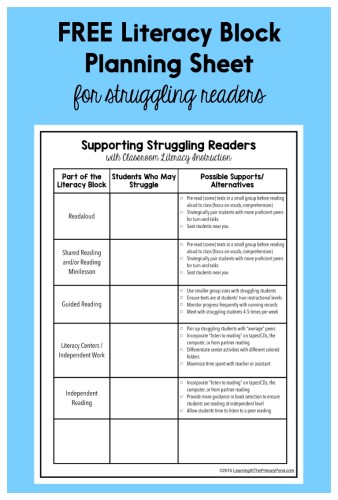
To receive a copy of the Literacy Block Planning Sheet pictured above, please sign up below. As a bonus, I will also email you the rest of the intervention toolkit as the free materials become available!
How Can We Intervene to Help Students with Decoding Difficulties?
Even when provided with fantastic, differentiated classroom instruction, some students are still going to struggle. These students need something extra, either from their classroom teacher, specialist, or another teacher.
This is when we want to provide an intervention – instruction in addition to the literacy instruction students are receiving in the classroom. When a primary student is having trouble with decoding, these are the specific steps I take:
- Analyze the child’s decoding errors to determine what the child is doing well, as well as what error patterns are present
- Teach specific phonics patterns and decoding strategies based upon my analysis of the child’s decoding errors
- Provide practice with appropriate phonological awareness skills
- Teach relevant high frequency words
- Create opportunities for the child to read and re-read as many texts as possible (volume reading)
Regardless of whether you are a classroom teacher, specialist, special education teacher, or other educator, you can use these same strategies to make a real difference for your struggling readers.
I’ve been in situations where I was the classroom teacher with no support whatsoever, as well as classroom teacher working with support staff, and now a reading specialist delivering the interventions myself. In all of these cases, taking these 5 action steps was both feasible for me to accomplish, and helpful in supporting my readers.
Each of my next 5 posts in this series will focus on one of the action steps described above. In my next post, I’ll share a video of how I use a running record to analyze decoding errors. I’m currently working on creating free running record sheets that will make it EASY for you to analyze students’ error patterns and figure out what strategies to teach them. I’m super excited to share those with you (and also start using them myself!). Make sure you are signed up so that I can send you the running records sheets when they are ready.
If you’ve reached the end of this post, THANKS for sticking with me! This blog series is now complete, and you can find the follow-up posts here:
How To Analyze Running Records (And Get a Ton of Valuable Information About Your Beginning Readers!)
How to Teach Decoding Strategies to Struggling Readers
Phonological Awareness Interventions for Struggling Readers
Phonics Interventions for Struggling Readers in K-2
How To Give Struggling Readers More Practice Time Through Volume Reading
Resources
Allington, Richard L. “What At-Risk Readers Need.” Educational Leadership 68.6 (2011): 40. MasterFILE Premier. Web. 11 Sept. 2011.
Hart, B. & Risley, T.R. “The Early Catastrophe:The 30 Million Word Gap by Age 3” (2003, spring). American Educator, pp.4-9.
Pinnell, G. S., & Fountas, I. C. (2009). When readers struggle: Teaching that works. Heinemann.
*The authors of these texts are in no way affiliated with this blog – I am referencing their work as a means of explaining and supporting the ideas I set forth in this post.*
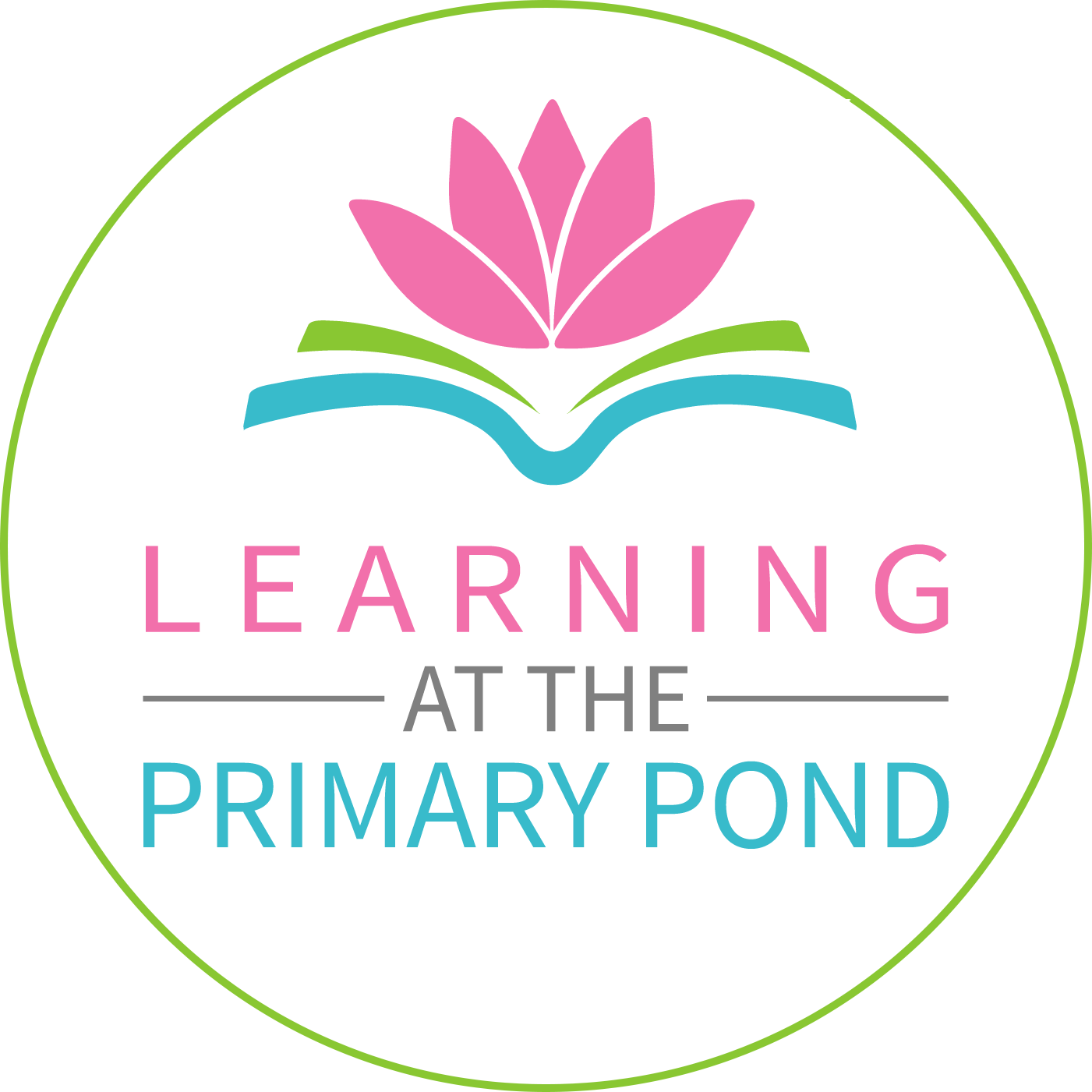


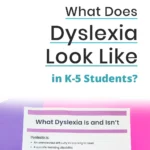
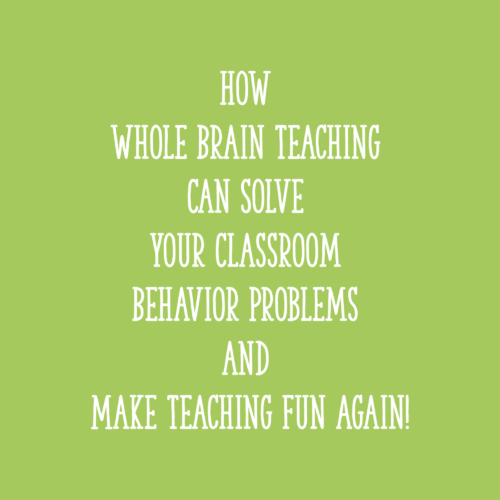
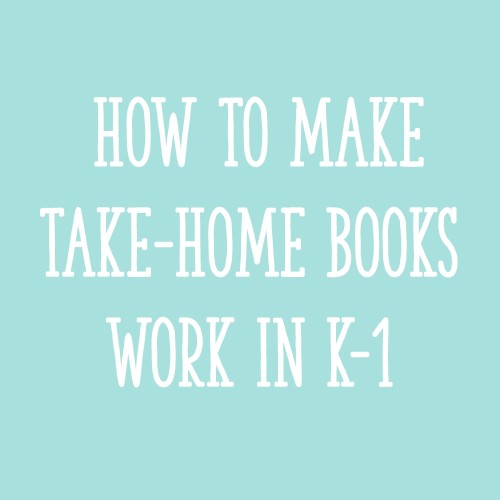


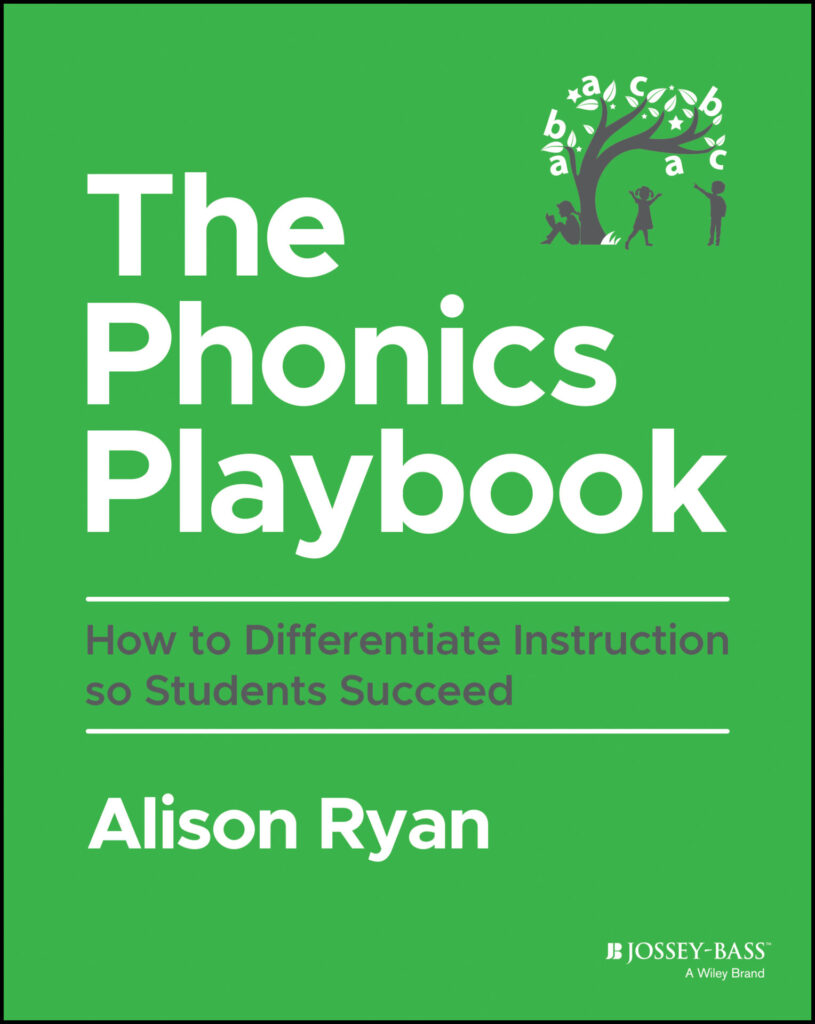
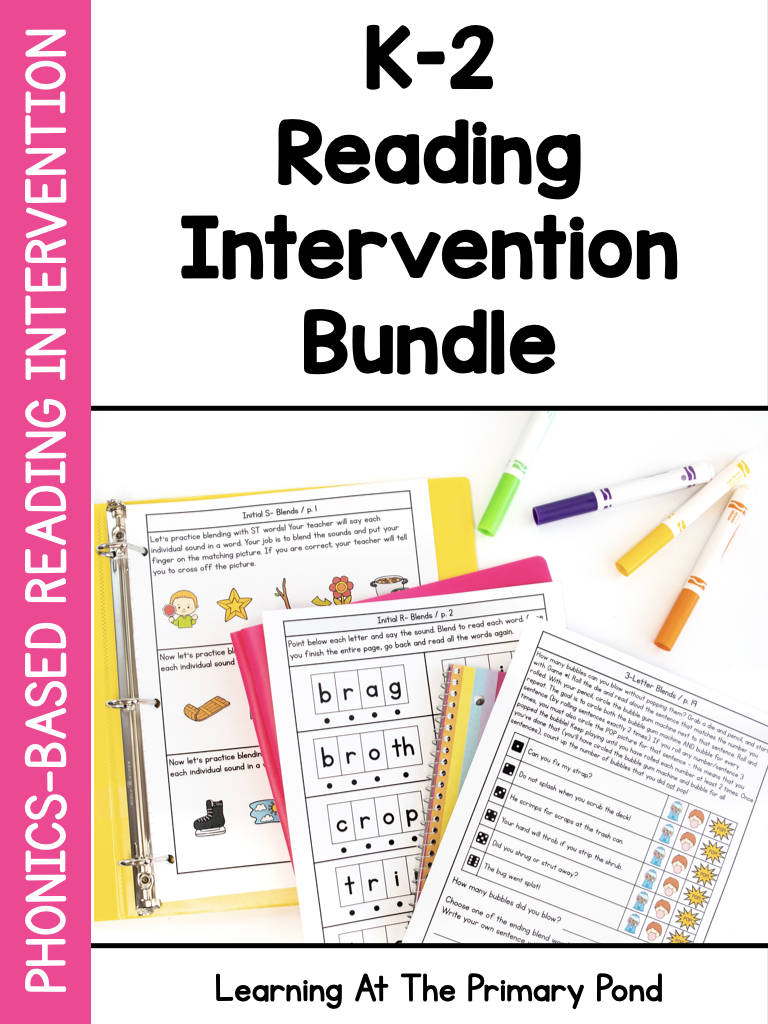
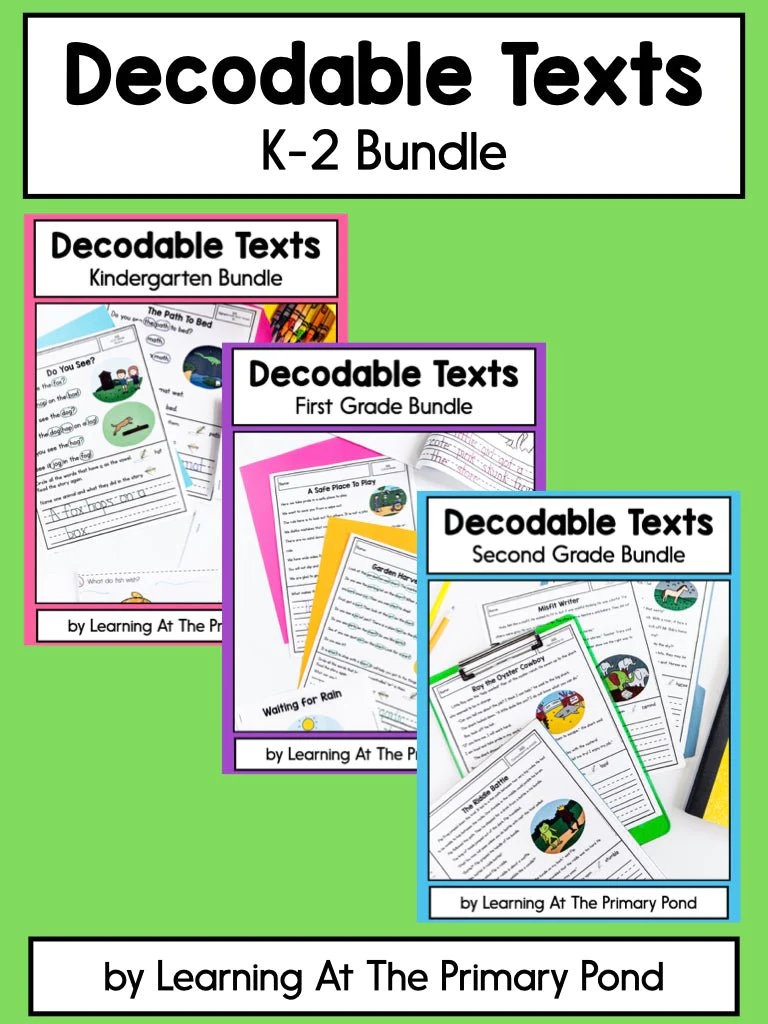

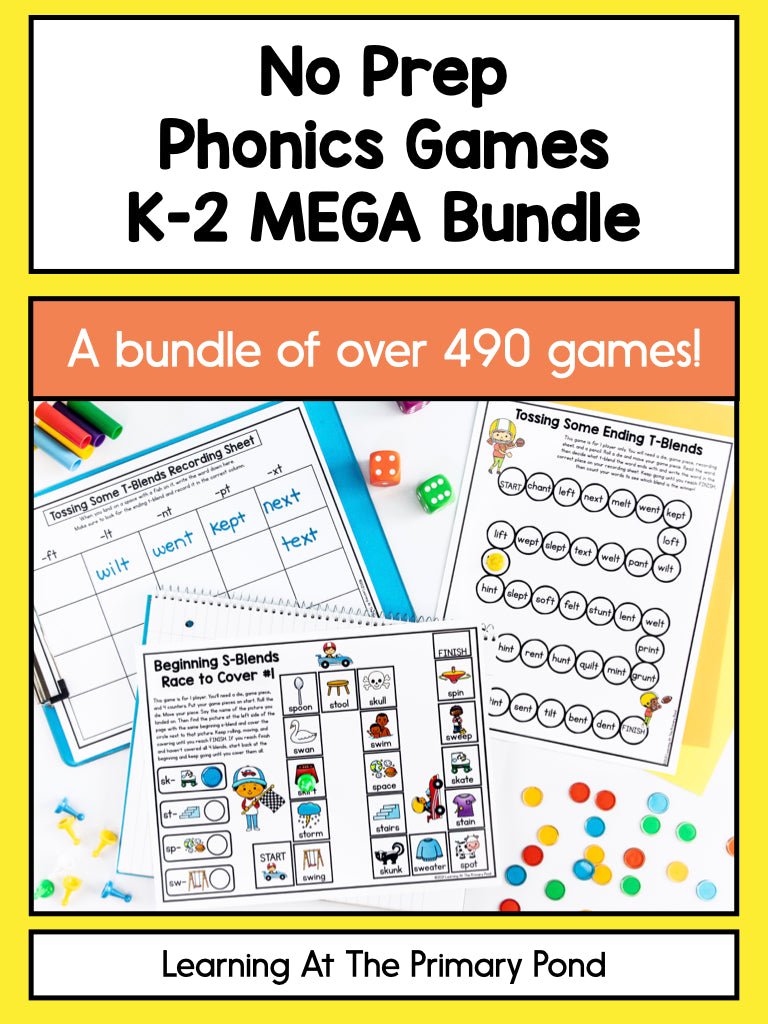
I LOVE your post and agree with everything you have stated. I am wanting to do a PD with my school on this. Thank you SO much for sharing and can’t wait to see your upcoming posts! 🙂
So glad it’s helpful, Renee! I’m so excited about doing this series. Thanks for following along! 🙂 Alison
Looking forward to more posts. Pinned so I can find the series later too. Thanks for sharing!
You’re welcome, Terri! Thanks for following along! 🙂 Alison
Would love the toolkit
Hi Kathy! Were you able to sign up for it using the form within this post? If not, just email me at LearningAtThePrimaryPond@gmail.com. Thanks!! Alison
Thank you for this post! What great focus. Can’t wait to read more.
You’re so welcome, Ginger! The other posts are finished now – I will go back and link to them in this post. 🙂 Alison
I would love the toolkit!!!
Hey there! If you scroll through the post, you’ll see that there’s a place (look for the small gray box) where you can put in your first name and email address – just fill it in there, and it’ll automatically be sent to you. I hope you enjoy the materials! Alison
I’m not a teacher, but my kindergartener is struggling with reading to the point of tears. I ran across this post last night and it makes so much sense! I’m going to use these strategies and tools throughout the rest of the school year and during the summer so that I can help my daughter become a better reader. Thank you so much!
I’m so glad it was helpful, Bree!! You sound like such a dedicated mom and I’m sure your daughter will make progress in time. Feel free to email me if there’s any way I can help!
Alison
I just found this on Pinterest, I teach children who have low German as a first language, they start learning English in kindergarten and learn high German (spoken and written) at the age of 6. It is about 50/50 when it comes to decoding problems. I also teach them from kindergarten to grade 5, all in one room. Needless to say your resources are a a gift ❤️
Oh wow, Jade! What a challenging position you have! I am so, so glad that the resources are helpful to you! Thanks for reading and commenting. 🙂
Alison
This is such great post! Thank you for sharing your toolkit; I just got the download for subscribing (there is so much there). Just what I was looking for.
Thanks, Erin! So glad the post and toolkit are helpful! 🙂
Alison
Hey Alison,
I was wondering if you could provide advice on how to create a literacy block schedule incorporating the 5 strategies for struggling readers. My class is a SPED class so all students are struggling. I want to make sure I still give them a full literacy block while also focusing on the interventions.
Hi Ali! I have some posts on literacy block scheduling that might be helpful. You can see those here:
https://learningattheprimarypond.com/blog/how-to-build-a-balanced-literacy-block-for-kindergarten/
https://learningattheprimarypond.com/blog/balanced-literacy-block-for-first-grade/
https://learningattheprimarypond.com/blog/fitting-it-all-in-how-to-schedule-a-balanced-literacy-block-for-second-grade/
https://learningattheprimarypond.com/blog/what-to-do-when-you-cant-fit-all-of-the-balanced-literacy-components-into-your-literacy-block/
Let me know if you have any questions!
Alison
Thank you, thank you. Using these articles full of information and resources both as a mom and teacher. I look forward to carrying this knowledge to apply in the classroom with my students… and at home!
So glad it was helpful!! Thank you for reading!
Alison
Hi, I’m a grandmother (and former kindergarten teacher) who would like to help my first grade grandson who is struggling with reading. He has a slight hearing deficit and is getting extra help now at school, but his parents would like me to help him practice two days a week. Evidently he has trouble differentiating vowel sounds. I happen to be slightly computer illiterate, but would any of your materials or ideas be helpful? Could you direct me on how to start with this without teaching him in a way that would be at odds with what the school is… Read more »
Hi Kathy! Happy to help! Can you email me at Alison@learningattheprimarypond.com? 🙂
Alison
This is interesting and extremely informative. I recently got the opportunity to assist some weak readers in a grade 4 class. I was introduced to this by another staff member and would like the weak readers to really benefit from using these strategies. Thank you very much.
Glad these tips were helpful!!